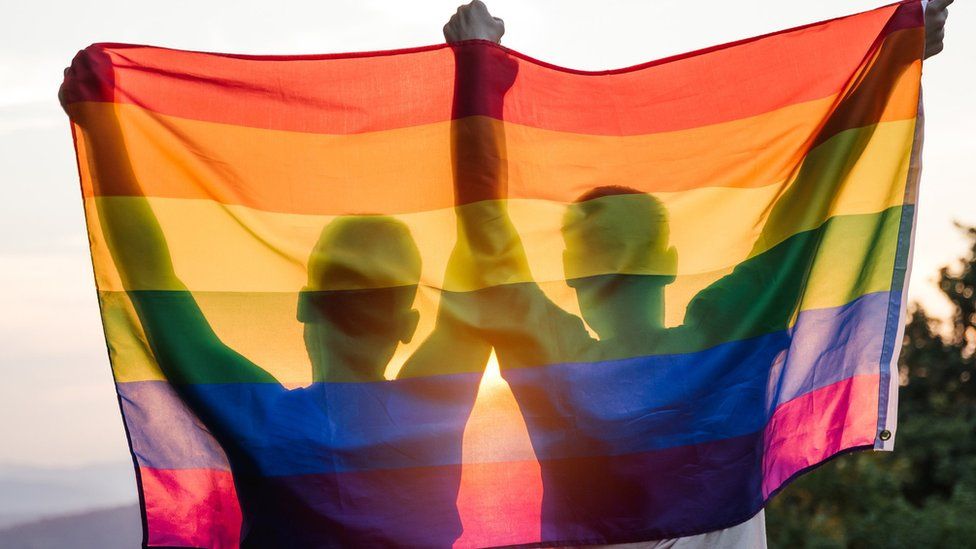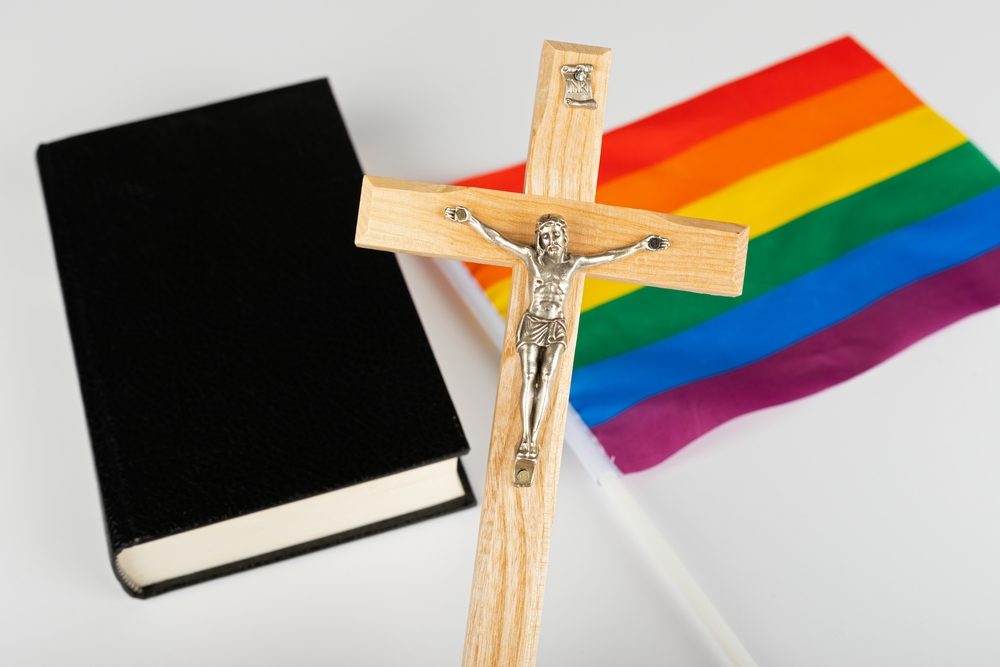Can I Still Be Accepted By God As A Gay Person? - Redditors' Theological Perspectives
Explore the question: Can I still be accepted by God as a gay person? Join the conversation on faith, identity, and love within Christianity.
Author:Bernard HorneNov 13, 202377.5K Shares1.1M Views

In the vast and diverse landscape of Reddit, where discussions on topics ranging from cats in funny hats to complex philosophical debates find their place, one Redditor, u/Mean-Elderberry937, dared to delve into a question that has puzzled and divided many for centuries: Can I still be accepted by God as a gayperson? This profound inquiry strikes at the heart of religious beliefs and personal identity, prompting a lively and thought-provoking conversation among the Reddit community.
The Question That Sparked Debate
User u/Mean-Elderberry937opened the discussion with a heartfelt query: "Can I still be accepted by Godas a gay? I know a lot of people say that there is no place for me in heaven and that I will die and burn in hell, but I want to know if I still believe in a God (which I do) then will he still accept me as his son?"
This question, posed by Mean-Elderberry937, touches on deeply ingrained theological beliefs and societal views that have often led to exclusion, discrimination, and pain for LGBTQ+ individuals. The responses that followed provide a glimpse into the diversity of perspectives within religious communities.
Theology And Acceptance
GardenGrammy59stepped into the conversation with a thoughtful response: "Assemblies of God I’ll let others debate the gayness being or not being sin and just say we are all sinners. Christdied for sinners." GardenGrammy59 draws attention to the Christian doctrine of salvation, emphasizing that, in Christian belief, Christ's sacrifice extends to all sinners, regardless of their specific sins.
They further quoted Romans 5:8, underscoring God's love for humanity: "But God demonstrates His own love toward us, in that while we were still sinners, Christ died for us. Much more then, having now been justified by His blood, we shall be saved from wrath through Him."
This perspective highlights the core Christian teaching that salvation is available to all who believe in Christ, emphasizing God's love and grace. It provides comfort to those who may fear exclusion based on their sexual orientation.
Theological Debate Ensues
However, luxmagchimed in, challenging this perspective: "OK, so it sounds like according to your theology you can go on deliberately sinning, practicing sin, and stay in God’s favor? because if that is true, we have to throw out john‘s first letter."
Luxmag's comment highlights a theological tension within Christianityregarding sin and salvation. Some argue that ongoing, unrepentant sin can separate individuals from God's favor, as seen in 1 John. This view raises questions about the compatibility of an LGBTQ+ lifestyle with Christian faith.
They continue, saying, "Well, actually, we have to throw out Paul’s letters too because he said sodomites will NOT inherit the kingdom of heaven. So are we throwing out those letters now? Let me know which ones to keep and which ones to throw away."
Luxmag's comment reflects the complexity of interpreting religious texts and reconciling them with contemporary beliefs and values. The mention of Paul's letters, which contain passages often cited in discussions about homosexuality, adds another layer to the theological debate.
Embracing The "Come As You Are" Approach
petitestylegirloffered a different perspective: "Some people think: change before you come to Jesus. But Jesus has people come, just as they are, to Him. And then HE works in them to renew their mind and life:)"
This viewpoint emphasizes the concept of coming to Jesus just as you are and allowing Him to initiate the transformative process. It challenges the idea that one must change before seeking a relationship with God.
Finding Common Ground
Randaximuscommended the diverse range of responses and the inclusive approach: "Wow. Perfect Trinity of answers and how all such questions should be answered. I debated whether to jump in when I saw this post but you three have Come to Jesus as you are. There is no other way anyway."
Randaximus acknowledges the importance of addressing such questions with empathy and understanding. They emphasize that accepting Jesus as Lord and Savior requires a willingness to follow His teachings and live in accordance with God's truth.
They elaborate, stating, "But accepting Him as your Lord & Savior means being willing to obey Him and sacrifice anything in your lifethat is incompatible or even truly distracting from your relationship. Sanctification and being transformed into the image of Christ, your nature becoming more like God's daily takes time, but DOES begin with stopping what you are humanly able to that's sinful or questionable and not a license to continue kind of sinning until God convicts you enough to stop."
This perspective highlights the importance of personal transformation and discipleship, emphasizing the need to align one's life with Christian teachings.
Now, as we delve further into the discussion, it's essential to introduce another perspective—one that emerges from the real-life journey of Becket Cook, shedding light on the complexities of faith, sexuality, and identity within the Christian context. To do so, we turn to an article written by Brett McCracken, who shares Becket Cook's journey in "From Gay to Gospel: The Fascinating Story of Becket Cook." Becket Cook's journey serves as a poignant reminder of the multifaceted nature of this ongoing dialogue, encouraging us to engage in thoughtful and compassionate conversations on this deeply personal and challenging topic.
The Remarkable Journey Of Becket Cook
In the midst of this engaging Reddit conversation, it's insightful to explore the real-life journey of Becket Cook, a man whose path led him from a vibrant gay lifestyle in the heart of Hollywood to a profound embrace of Christianity.
Becket Cook: From Gay To Gospel
A decade ago, Becket Cook was a prominent figure in the bustling world of Hollywood. His career as a set designer in the fashion industry had reached impressive heights, allowing him to work alongside celebrities and supermodels. He jet-setted around the globe, designing photo shoots for renowned publications such as Vogue and Harper's Bazaar. Cook's life was a whirlwind of glamour, complete with attendance at award shows and poolside summers at Drew Barrymore's residence.
Yet, as fate would have it, Cook's life was destined for a dramatic transformation—a transformation he would eventually come to cherish.
A Life-Altering Encounter In 2009
The turning point in Becket Cook's life occurred in September 2009 during a seemingly ordinary day at Intelligentsia, a coffee shop in L.A.'s Silver Lake neighborhood. There, Cook struck up a conversation with a group of youngpeople who sat with physical Bibles open before them—a sight not typical of that era. These individuals belonged to Reality L.A., a churchthat would play a pivotal role in Cook's spiritual journey.
His encounter with these Bible-studying Christians led Cook to visit Reality L.A. the following Sunday. It was there that he heard the gospel message and made a life-altering decision: to give his life to Jesus. This marked the beginning of a profound transformation that would ultimately lead him to write his memoir, "A Change of Affection: A Gay Man’s Incredible Story of Redemption."
A Transformative Moment In Paris
The roots of Cook's spiritual journey can be traced back to a pivotal moment six months before his encounter with the Bible-studying group. It took place during a fashion party in Paris, where Cook was overcome with an overwhelming sense of emptiness despite the glittering success and opulence that surrounded him. This intense "is that all there is?" moment prompted Cook to question the very meaning of life. However, he had always considered God off-limits due to his understanding of biblical teachings on homosexuality.
When he met the group of young Christians at the coffee shop, Cook's openness to their message was rooted in the lingering memory of that moment in Paris. He began asking questions about the gospel, even inquiring about the church's stance on homosexuality. Their honesty and unwavering belief in the biblical view that homosexuality was a sin left a lasting impact on him.
The Power Of Discipleship And Support
Cook's journey as a new Christian was marked by discipleship and support from fellow believers. Tim Chaddick, the preacher at Reality L.A., challenged his preconceptions about religion, leading Cook to embrace the gospel. Coffee meetings with Tim and the support of the church community played a crucial role in Cook's spiritual growth.
Cook's transformation wasn't limited to his perspective on sexuality; it extended to every aspect of his life. He found solace and purpose in his relationship with Christ, gradually shedding the empty pursuits of his past.
The Incompatibility Of "Gay Christian"
Becket Cook's experience underscores his belief that identifying as a "gay Christian" is incompatible within the Christian faith. He argues that labeling oneself in such a way perpetuates an unnecessary connection to sin, emphasizing the importance of a clean break from one's previous identity.
The Cultural Shift
Cook also reflects on the significant cultural shift regarding homosexuality. Over the past two decades, the narrative around being gay has evolved from being viewed as a sin to being celebrated as an identity. Cook highlights the use of biblical symbols, like the rainbow, in the LGBTQ+ movement, emphasizing the attempt to erase any sense of shame and convince individuals that their identity is righteous.
Becket Cook's journey provides a real-life example of someone who has navigated the complexities of faith, sexuality, and identity within the Christian context. His story serves as a poignant reminder of the multifaceted nature of this ongoing dialogue, encouraging us to engage in thoughtful and compassionate conversations on this deeply personal and challenging topic.
Can I Still Be Accepted By God As A Gay? - FAQs
Is It Possible To Reconcile Being Gay With Christian Faith?
It depends on one's interpretation of Christianity. Some Christians believe it's possible, while others maintain that being gay is incompatible with their faith.
Does The Bible Specifically Condemn Homosexuality?
The Biblecontains verses that have been interpreted as condemning homosexuality, such as Leviticus 18:22 and 1 Corinthians 6:9-10. However, interpretations of these passages vary among Christians.
Can A Gay Person Be A Christian And Still Have A Relationship With God?
Many Christians hold that a person's sexual orientation does not determine their relationship with God. The acceptance of LGBTQ+ individuals in faith communities varies.
Is It Possible To Change One's Sexual Orientation Through Conversion Therapy Or Prayer?
Efforts to change sexual orientation, such as conversion therapy, are widely discredited and opposed by most medical and psychological associations. Prayer may provide support but is unlikely to change one's inherent orientation.
What Do Some Christians Mean When They Say, "Come As You Are" To LGBTQ+ Individuals?
This phrase emphasizes that anyone, regardless of their past or sexual orientation, is welcome to come to Jesus without the need to change first. The belief is that transformation occurs through faith.
Is Identifying As A "gay Christian" Contradictory Within Christian Theology?
This is a topic of debate. Some argue that identifying as a "gay Christian" perpetuates a connection to sin, while others see it as an acknowledgment of one's sexual orientation while maintaining faith.
How Do Christians Respond When Someone Close To Them Comes Out As Gay?
Christian responses vary. Unconditional love is encouraged, but some may struggle to reconcile their beliefs with the revelation and may need time to adjust.
What Role Does Culture Play In Shaping The Perception Of Being Gay Within Christianity?
Culture has a significant impact. Over time, views on homosexuality have evolved from being seen as a sin to being celebrated as an identity.
Can A Person Be Both LGBTQ+ And Deeply Committed To Their Christian Faith?
Many LGBTQ+ individuals reconcile their faith and identity by finding affirming religious communities. It's a deeply personal journey.
What Can Christians Do To Engage In Compassionate Conversations About Faith And Sexuality?
Christians can seek understanding, listen empathetically, and respect diverse viewpoints. Engaging in open dialogue promotes compassion and growth in faith communities.
Conclusion
In conclusion, the question, "Can I still be accepted by God as a gay?" remains a profound and deeply personal one. It is a question that transcends theological boundaries and invites us to explore the intricate relationship between faith, identity, and love. It underscores the need for understanding and empathy within faith communities, as individuals grapple with their beliefs and seek acceptance within the context of their spirituality.
In this ongoing dialogue, the question, "Can I still be accepted by God as a gay?" continues to be a guiding light, encouraging us to engage in compassionate and respectful conversations that promote growth, understanding, and unity.

Bernard Horne
Author
In this signature of the father, Jesus, and the holy spirit. Exploring how God’s Word challenges us to live 100% according to His will so that we can come to a life of victory!
Latest Articles
Popular Articles


